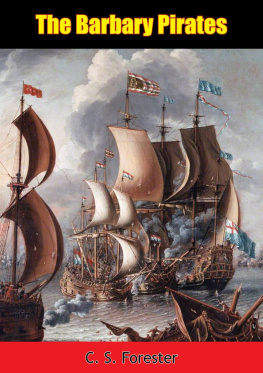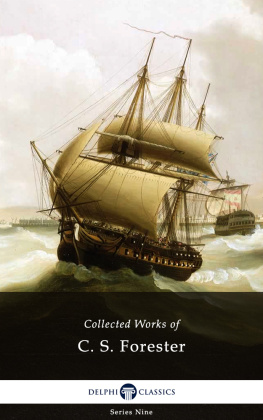

This edition is published by Papamoa Press www.pp-publishing.com
To join our mailing list for new titles or for issues with our books papamoapress@gmail.com
Or on Facebook
Text originally published in 1953 under the same title.
Papamoa Press 2017, all rights reserved. No part of this publication may be reproduced, stored in a retrieval system or transmitted by any means, electrical, mechanical or otherwise without the written permission of the copyright holder.
Publishers Note
Although in most cases we have retained the Authors original spelling and grammar to authentically reproduce the work of the Author and the original intent of such material, some additional notes and clarifications have been added for the modern readers benefit.
We have also made every effort to include all maps and illustrations of the original edition the limitations of formatting do not allow of including larger maps, we will upload as many of these maps as possible.
THE BARBARY PIRATES
By
C. S. FORESTER
Illustrated by CHARLES J. MAZOUJIAN
TABLE OF CONTENTS
Contents
1

FOR CENTURIES THE BARBARY PIRATES HAD plagued the world. Long before any settler had set foot in the New World they had begun their raids on merchant vessels.
Cervantes, who later was to write the story of Don Quixote, was a prisoner of the Barbary pirates a generation before Raleighs colonists landed at Roanoke in 1587. More than a century later Defoe, writing about a popular hero of fiction, Robinson Crusoe, told about his capture by, and escape from, the rovers of Sallee in Morocco.
How did this nuisance begin? Why did the civilized world put up with it for so long?
It should be understood that the Barbary pirates were not pirates in the real sense of the word. They were the citizens of countries which were at war with other countries. They captured prizes and took prisoners just as any warring nation did. At first the Barbary pirates had a religious reason for their wars: they were Mohammedans and they considered it their duty to make war on the Christians. When the Mohammedans enslaved their prisoners they were not behaving any worse than their enemies did, for in those days there were no international treaties regarding the treatment of captives.
Later on, when other countries began to observe certain rules in these matters, the Barbary States followed their example to a certain extent. They solemnly declared war and made peace. They kept their prisoners at hard labor and sold them for ransom, but in that hard world of long ago, prisoners could nowhere expect kind treatment. The ransoms that the pirates demanded were like the war indemnities and tribute money demanded in treaties of peace by other countries.
The name Barbary States came from a term originally used by the Greeks. Two thousand years before, they had called all those who did not speak Greek Barbarians. This name was used in an effort to imitate the strange speech of foreigners, and it came to be permanently applied to the people of North Africa, the Berbers.
The homelands of these peoplethe four North African countries of Morocco, Algiers, Tunis, and Tripoliwere known as the Barbary States. They were parts of the vast Mohammedan Empire which at one time had threatened to conquer the whole world. Later, this empire fell to pieces of its own weight, largely because it had never been able to build any system of government except a simple tyranny.
The Arab Mohammedan conquest of North Africa had not been very successful. Local generals, and governors, and religious leaders managed to set themselves up as independent. At the same time they posed as dutiful subjects of the central government at Constantinople. But their rulers did not have an easy life, even if they lived in the midst of great wealth and enjoyed unlimited power.
The Dey or Bey, Pasha or Emperor, whatever the local ruler called himself, lived only as long as he could remain more powerful than his rivals and enemies. The moment his grasp weakened he could expect to be strangled and to be succeeded by someone else eager to take his place. The truth was that a large part of the people were no more loyal to their rulers than their rulers were to Constantinople. They paid taxes only when the ruler was strong enough to compel them; and they were often hostile and independent under their own chiefs.
It was only in the walled towns, and along the coastal strip, and in the accessible valleys, that the Mohammedan rulers could enforce their will. The pirate cities were often shut off, with the sea on one side and an enemy countryside on the other. So the rulers living in these seaboard towns came to be dependent for their luxuries, and even for their necessaries, on what they could steal from the outside world. The sea was far more open to them than the mountains and deserts that hemmed them in at their backs. With the loot they could win at sea they could buy their food from neighboring tribes. The slaves they captured could build palaces and fortifications for them, and they were thereby saved from any necessity to do honest work.

So to sea they went, capturing poorly armed ships, and often raiding the Christian coasts to loot the villages. The shores of Italy and France, sometimes even Ireland and once or twice Denmark, saw the Barbary pirates landing to carry off plunder and slaves. They exercised a certain amount of care not to anger powerful nations who might fight back. Often the pirates were glad to accept money instead of plunder, and ransom for the slaves. Up to a point money was more useful to them than either. But only up to a point.
The pirates must have war. Otherwise, the world would soon cease to fear them. Furthermore, among Arab pirates it was considered the mark of a gentleman to go out fighting now and then. So the Deys and the Beys went on raiding peaceful commerce. They knew perfectly well that if they stopped, there would be shortages of necessary goods among their subjects. These people would quickly find a ruler who would promise to manage things better.
Naturally the civilized world did not accept all this looting and piracy without protest. Over and over again European countries sent armed forces to North Africa. Spain and Sicily and France all sent their fleets and sometimes their armies. One of Britains best admirals, Blake, was sent by Cromwell in the seventeenth century with a fleet that bombarded Tunis and for a short time brought order to the Mediterranean. Repeatedly, the European powers seized portions of North Africa and held them for a time. This was one of the best ways to control the Barbary States, for any Christian foothold in North Africa broke the chain of coastwise navigation that was important to a country of few roads.
Portugal provides another example of the struggle against the Barbary States. Before Columbus discovered America, Portugal conquered Tangier and held the city for two hundred years. But the further history of the occupation is unfortunately typical. Tangier had to be occupied by Portuguese soldiers to defend it from the attacks of the Moors. Danger was constant and fighting frequent, and the occupation was expensive in money and men, while the returns in terms of trade were poor. The Portuguese could not make the place pay any more than the Moors could without piracy.
Next page








